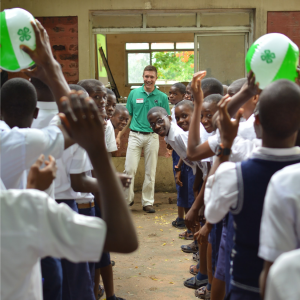Returned AgriCorps Fellow: Dustin Homan
Placement: 4-H Ghana Office, Koforidua, Eastern Region, Ghana
What are you up to now? Tell us about your day-to-day duties.
I am a Program Manager for Ohio State University Extension – 4-H Youth Development. Part of my role is to help start and sustain 4-H-like organizations in other countries by sharing our resources and in order to create connection experiences for our Ohio 4-H youth. We have focused our partnerships with 4-H in Ghana, Nigeria, Ukraine, and Kosova, and 4-S in Nicaragua and Honduras. I also coordinate 13 animal science-related events and competitions offered during the Ohio State Fair for 4-H and FFA youth.
What similarities do you see in agricultural education and extension between the U.S. and Ghana?
I saw a similar need for agricultural education in Ghana that we in the U.S. experienced in the early 1900s – a need for improved agricultural technology and diffusion, hands-on learning so youth could acquire skills, and convincing youth that an agricultural career can be ‘cool’. Organizations, such as 4-H and FFA, were initiated and have prospered globally because of their unique positions to do these things. I was also surprised at how positive youth development concepts transcend geographic boundaries. A relationship with a caring adult, hands-on learning, and opportunities to lead are the three methodologies that ‘work’ in all of the places I have been in order to help youth thrive.
And differences?
The projects! I saw 4-H Ghana members raising grasscutters (think of an animal that looks like a groundhog) that is a delicacy to eat to there, cultivating cocoa trees that will eventually be used to produce chocolate, and crafting glass beads that were used to make beautiful necklaces and bracelets. Another difference I saw was how the community interacted with the school. In the U.S., community members come to the schools for sporting events and drama productions. In Ghana, community members were engaged through the PTA (Parent Teachers Association) and open houses the school would frequently host where youth would show-off what they were doing.
How did your time as an AgriCorps Fellow shape your views on international development?
Specifically related to food security, being an ACF helped me understand that global hunger and poverty is not simply solved by producing more food. I saw a plethora of food options in Koforidua, where I lived, and, at the same time, malnourished young people and adults. For some, it’s the inability to purchase food due to their economic situation. I employ a much more robust and critical framework when we are brainstorming projects with other countries now after my time as a Fellow, from asking questions about how ideas will be implemented in different cultural contexts to how projects will sustain themselves.



